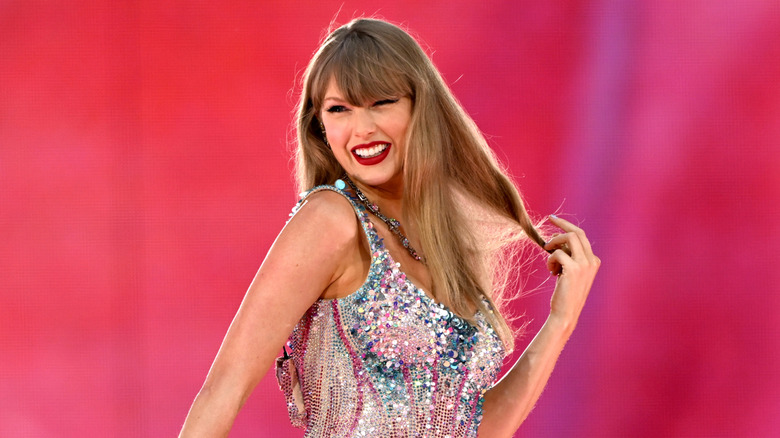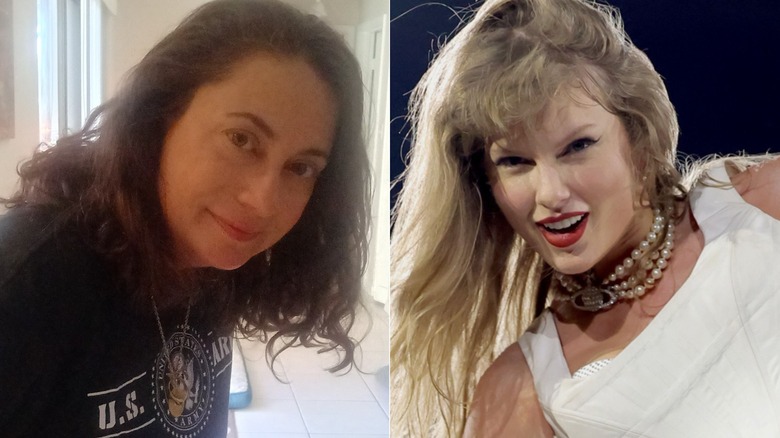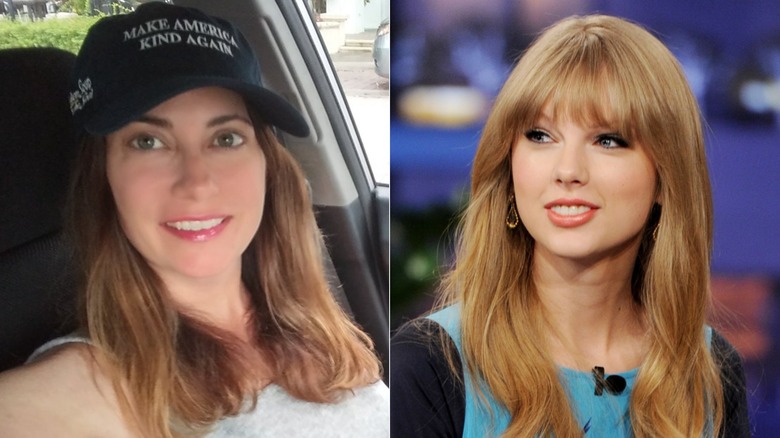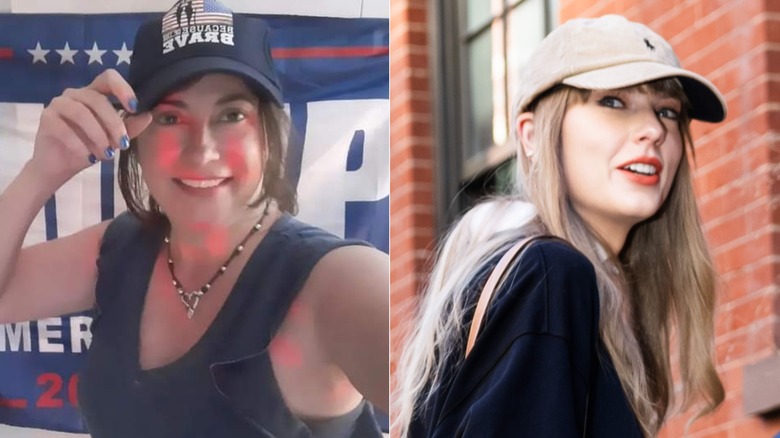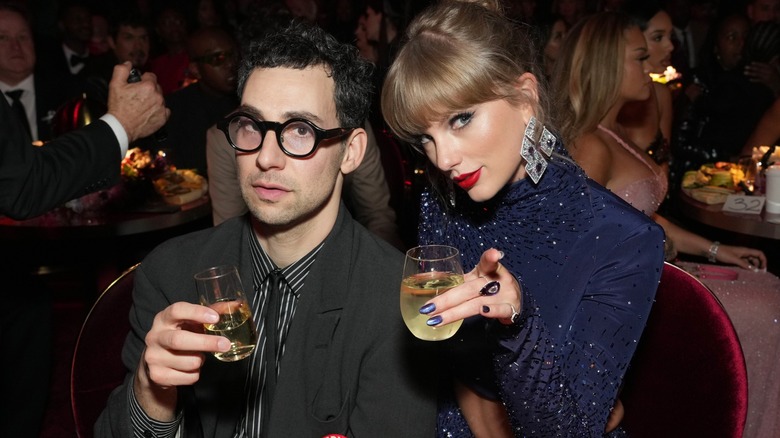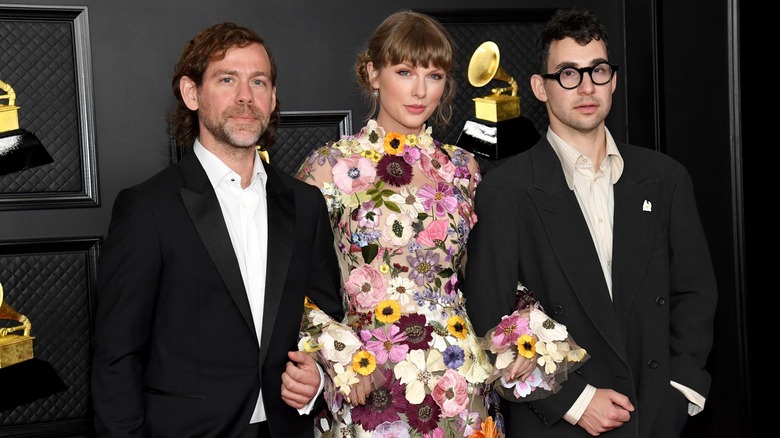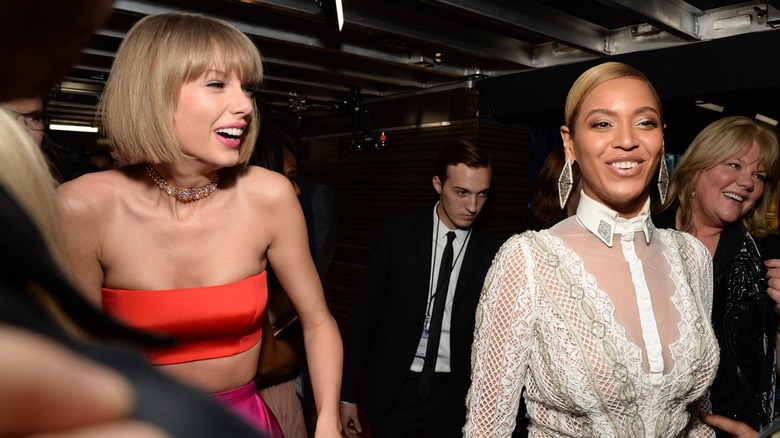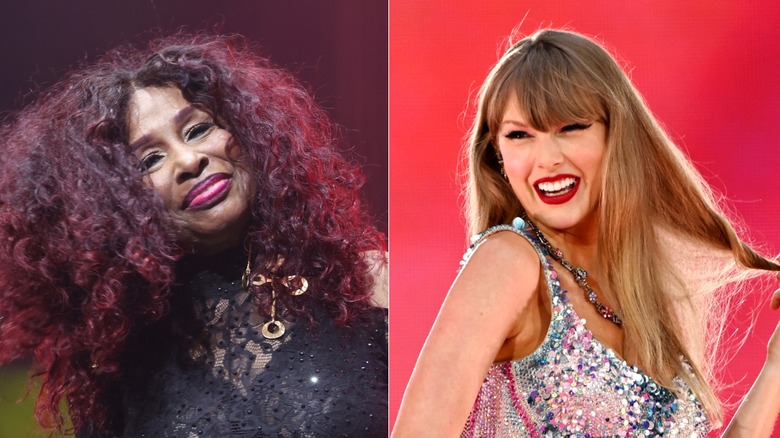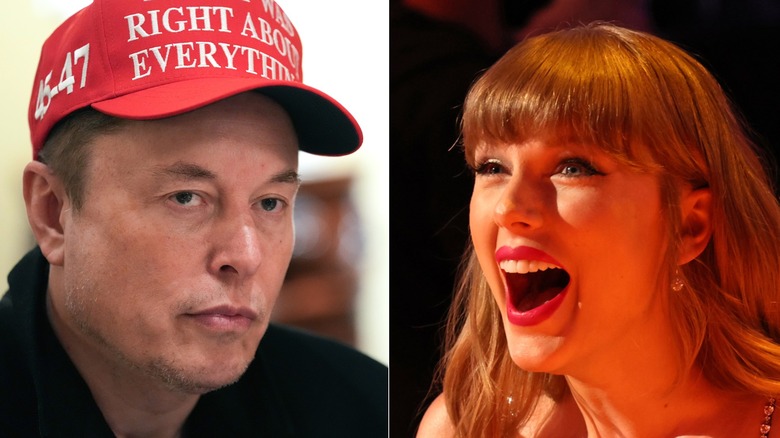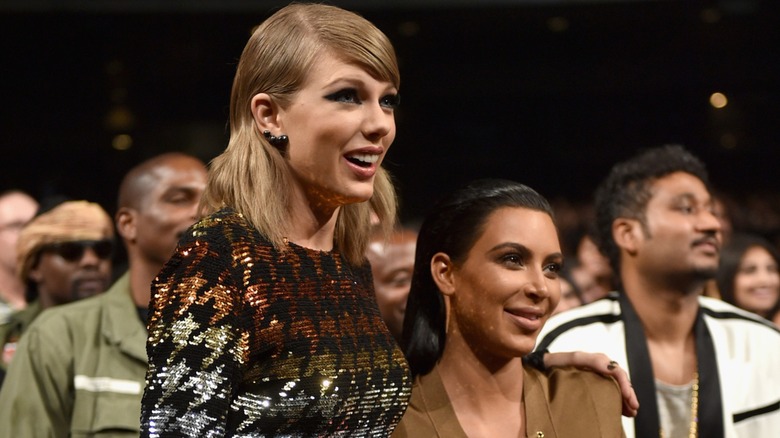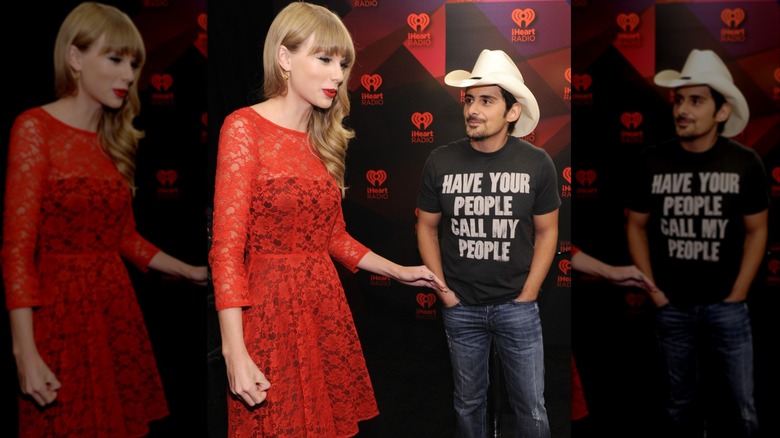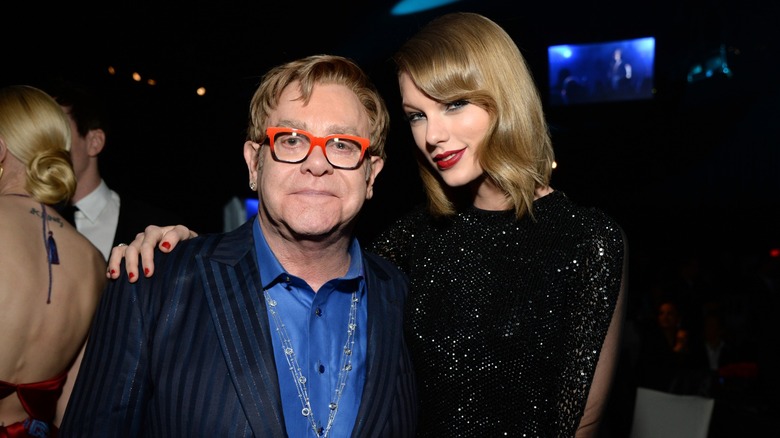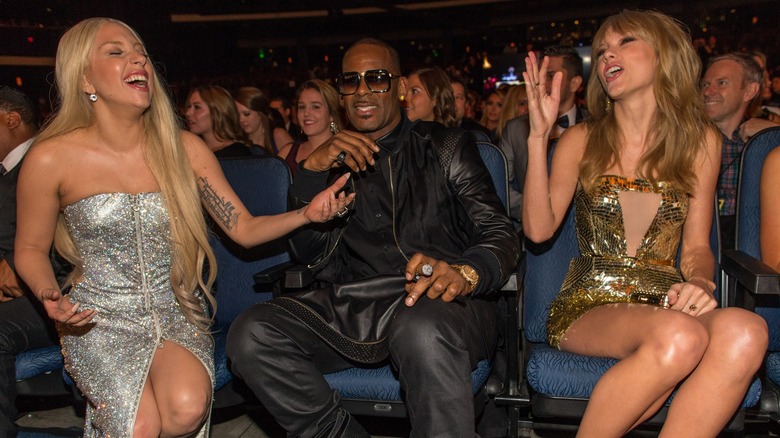Taylor Swift's Legal Drama Explained And All The Celebrities Involved
Taylor Swift is no stranger to courtroom drama. After all, when she was sexually assaulted by a radio DJ in 2013, she complained and he was fired. He sued her for millions; she countersued for $1 to make a point. On the stand, she told the man's lawyer (via Time), "I'm not going to let you or your client make me feel in any way that this is my fault. Here we are years later, and I'm being blamed for the unfortunate events of his life that are the product of his decisions, not mine." She won.
She's also been sued several times over the years by people who allege that she's copied them. This is something that happens regularly to major artists who have hit songs. "Superstars like Taylor Swift are often involved in copyright lawsuits," former federal prosecutor Neama Rahmani told Newsweek. "Their music is very valuable, so they have to sue others to protect it. But they're also targets for lawsuits because of how rich and famous they are."
Swift is likely hoping that a judge agrees she's been targeted, as the latest lawsuit against the "Bad Blood" singer accuses her of copying numerous lyrics from a poet named Kimberly Marasco. She believes that her work provided the inspiration for many of Swift's songs, and she's sued the singer to see how the court feels. Read on to learn about the legal drama, including why numerous other celebs have gotten dragged into the mess.
Kimberly Marasco claims The Eras Tour made her realize she'd been copied
In 2025, Kimberly Marasco, a woman who has self-published several books of poetry, filed a lawsuit against Taylor Swift. Her Amazon bio includes out-of-print books like "Poetry Revelations about the Woke Mob," which apparently includes several poems from her first book, "Fallen From Grace," which were supposedly copied by Swift. "The poems penned by the author reveal many disturbing truths about an evil entity pervading our society," the book's description reads, though it's unclear whether she means "the woke mob" or Swift.
Marasco claims not to have been a fan of the singer, barely having noticed the alleged similarities in their work until she watched "The Eras Tour." In the lawsuit filed against Swift, Marasco's lawyers wrote, "In 2024, Plaintiff discovered most of the infringing activity by a co-worker commenting on the substantial similarity of the Defendant's music to the Works as well as after viewing the 'Eras Tour' over the internet and on television."
It seems unlikely that Marasco didn't notice any similarities until 2024; after all, she's been complaining about Swift on X, formerly Twitter, for years. For example, she posted an illustration depicting "Taylor Swift's Inkjet Copy Machine" back in 2022, writing, "It was the Midnight Frame," a reference to Swift's song "Midnight Rain." "The Eras Tour" wouldn't kick off for many months after that post.
Kimberly Marasco first sued Taylor Swift in 2024, but the lawsuit was dropped
Kimberly Marasco first sued Taylor Swift back in 2024, alleging numerous instances of copyright infringement thanks to supposed similarities she'd discovered between her own poems and the lyrics of Swift's songs. She first sued in small claims court, but the case was transferred to Federal Court in the Southern District of Florida.
That's how it landed on the bench of Judge Aileen Cannon who made headlines when she dismissed the classified materials case against President Donald Trump. Marasco ran into trouble when she attempted to serve Swift the lawsuit; after all, it's pretty tough for a self-published poet to find an audience with one of the world's biggest superstars, especially as she was on a world tour at the time. Marasco told the court that she'd served a representative of Swift at her Nashville home, but her lawyers said that the home did not actually belong to Swift. "Even after a person accepted service for her at a residence in Tennessee, the defense team claimed the person doesn't know her but the person who accepted service never made any statement," Marasco told Newsweek.
Ultimately, Swift was personally dismissed from the lawsuit, though the complaint against Taylor Swift Productions was allowed to continue. "I've heard of horror stories when it comes to service of process so it wasn't a surprise," Marasco allowed.
The 2025 lawsuit alleges that Taylor Swift copied numerous songs from Marasco's poems
In 2025, Kimberly Marasco sued Taylor Swift again, this time laying out numerous places where she alleged that Swift stole her intellectual property. "Defendants have willfully infringed Plaintiff's rights by showing their individual and joint reckless disregard for or willful blindness as to Plaintiff's copyrights," the lawsuit reads. "The harm caused to Plaintiff is irreparable."
Marasco's lawsuit includes many examples, including the claim that Swift's song "The Man" was copied from Marasco's poem "Ordinary Citizen." Swift's song goes, "I'm so sick of running as fast as I can / Wondering if I'd get there quicker if I was a man / And I'm so sick of them coming at me again." Marasco says that's the same thing as her poem, which went, "I'm running behind / You say its His word against mine / No one will listen / Because I'm only an ordinary citizen." You can draw your own conclusions about that one!
The lawsuit is lengthy, and the examples go on. Here's another: Marasco once wrote "What I found is that when you write from your heart, it results in a work of art," while Swift's song "I Can Do It With A Broken Heart" includes the lines, "I cry a lot but am so productive, it's an art / I can even do it with a broken heart." The courts will have to decide whether Marasco invented rhyming "heart" with "art."
Jack Antonoff was also named as a defendant in Kimberly Marasco's lawsuit
This time around, Kimberly Marasco has added some plaintiffs to her lawsuit. She's also suing Bleachers frontman Jack Antonoff, who has worked as a producer on numerous Taylor Swift albums. In fact, Swift has repeatedly shouted out Antonoff's creative input in her writing process. When she released "Midnights" in 2022, for example, she credited her collaborator on Instagram, writing, "I couldn't be happier that my co pilot on this adventure was @jackantonoff. He's my friend for life (presumptuous I know but I stand by it) and we've been making music together for nearly a decade."
Antonoff loves to praise Swift, too. Speaking with NME in 2021, he showered compliments on his friend. "She has a long history of rightly exposing some real darkness in the music industry," he said, referring to her legal battle to own her music. "And I'm personally thankful for it, outside of our friendship and working relationship, just as an artist." In fact, here are five times Jack Antonoff went to bat for Taylor Swift.
Marasco, on the other hand, isn't a fan. "[Antonoff's] songs contain a number of creative expressions that copied the text, images, and designs without authorization or credit to the detriment of the Plaintiff, Original1," the lawsuit reads.
Kimberly Marasco is suing Aaron Dessner as well
In addition to Taylor Swift and Jack Antonoff, Kimberly Marasco is also suing Aaron Dessner, front-man of indie-rock sensations The National. Like Antonoff, Dessner has worked as a songwriter and producer on several recent Swift albums, providing input on modern classics like "folklore" and "evermore."
Dessner is quite happy to be part of Swift's stable of producers. In 2023, for example, he congratulated her on the re-recorded version of her album "Speak Now" on Instagram, writing, "I'm so grateful for every opportunity I've had to work with Taylor and I am constantly inspired by the example she is setting for all artists that you have the right to own your own work and chart your own path without compromise."
The lawsuit points out that Dessner contributed to tracks like "Death By A Thousand Cuts," "Robin," "Cardigan," "Clara Bow," "Right Where You Left Me," and "Invisible String," all of which Marasco claims contain material substantially lifted from her work. For example, she claims that "Invisible String" contains "unique expressions" stolen from her poem "Time." In the song, Swift sings, "Time, mystical time, cutting me open then healing me fine." In her poem, Marasco wrote, "Time, what is time? All I know, it's never been kind." Again, it'll be up to the courts to decide whether that's enough to be considered plagiarism, and you can draw your own conclusions in the meantime.
The lawsuit mentions Beyoncé
When Kimberly Marasco sued Taylor Swift the first time, even though she hadn't actually been served in the lawsuit, her lawyers responded to several of the accusations. They often pointed out that the details Marasco alleges were copied aren't actually all that unique, usually by pointing out other songs that cover similar material in similar ways. This time around, Marasco responded to several of those responses, dragging other celebrities into the lawsuit.
That includes Beyoncé, who shows up in the section devoted to Swift's song "The Man." Marasco alleges that this song was partially based on her poem "Ordinary Citizen," but Swift's lawyers pointed out that Beyoncé's "If I Were A Man" pre-dated "Ordinary Citizen" and also imagines a reversal of gender norms. "In the previous complaint, the Defense compares this to Beyoncé's song 'If I Were A Boy,'" the lawsuit reads. "However, Beyoncé is describing a boy in the world (not in an office setting) and how the boy should be more compassionate toward females. This is a completely different context."
Beyoncé isn't being accused of anything here, and she's a busy lady; chances are, she has no idea she's been name-dropped like this. She tends to support Swift, though; click here for a look at Taylor Swift and Beyoncé's superstar friendship.
Chaka Khan got name-dropped, too
Beyoncé's "If I Were A Boy" isn't the only song that shows up as a comparison in Kimberly Marasco's lawsuit against Taylor Swift. Chaka Khan got a mention, too, thanks to her song "A Woman in a Man's World." Swift's lawyers were trying to point out that plenty of songs before Marasco's poem considered the place of women in the world compared to men, and "A Woman in a Man's World" certainly covers that territory.
Marasco disagrees. The lawsuit points out, "Khan's lyrics include 'in a dog-eat-dog, show biz town,' referring to the entertainment industry and how she has a dream but that others drag her down because she is in a Man's world. There are no similar unique expressions found in this song."
In this one particular instance, Khan would probably agree that she shouldn't be compared to Swift's music. The two haven't really acknowledged each other save for one incident back in 2016. After The Shade Room said Swift was considering a hip hop album, Khan commented (via BET), "Wow what a new concept!!" The sarcasm is loud and clear.
Kimberly Marasco accused Taylor Swift of copying her poem about Elon Musk
Kimberly Marasco's lawsuit against Taylor Swift doesn't only mention other singers and songwriters. Marasco is a big fan of Elon Musk, the richest man in the world; he's a controversial figure who is currently heading the non-governmental agency bent on defunding and firing entire sections of the United States government. He's so controversial, in fact, that Donald Trump and Elon Musk's bromance may already be over, but Marasco seems to be sticking by her fandom of the Tesla CEO.
After all, she once wrote a poem for him on X, formerly Twitter, the social media platform that he purchased and renamed several years ago. Court filings allege that Swift copied that poem — titled "Elon=MC2" — when she sang "to assess the equation of you" in the song "Mastermind." Marasco insisted that comparing someone to an equation was "eerily similar" to her own work.
Musk and Swift are no big fans of one another. After Swift endorsed Kamala Harris for the 2024 presidential election, Musk wrote on X, "Fine Taylor ... you win ... I will give you a child and guard your cats with my life." Swift didn't need to respond and call that message creepy; the entire internet basically did it for her.
The lawsuit doesn't think thanK you aIMee is about Kim Kardashian
Artists and tech CEOs aren't the only famous people who show up in Kimberly Marasco's lawsuit against Taylor Swift. There's also a section about Swift's feud with Kim Kardashian, thanks to her song "thanK you aIMee." While pretty much the entire world thinks that song is about the reality star — check out those capitalized letters — Marasco thinks it might be about a certain Floridian poet instead.
Though Marasco isn't including "thanK you aIMee" on her list of stolen songs, she mentions in an exhibit that the lyrics of the song suggest that no one knows who it's really about. Swift sings, "A song that only us two is gonna know is about you," so Marasco reasons that if everyone thinks it's about Kardashian, then it must actually be about a different "Kim."
Never mind, apparently, the fact that the full verse is specifically about "Aimee's" children not knowing the meaning of the song after the passage of time.
Brad Paisley's Perfect Storm got a mention in the lawsuit
As with Chaka Khan and Beyoncé, Brad Paisley was name-dropped in Kimberly Marasco's lawsuit as a way to make the point that her poems are closer to Taylor Swift's music than Swift's music is to her fellow songwriters'. (Follow that?) In this case, Marasco points out that a previous court filing compared Marasco's poem "Delusional Reality," Swift's song "Midnight Rain," and Paisley's song "Perfect Storm."
Marasco insists that "Midnight Rain" copied "Delusional Reality." "Drowning in my storm, waves crash the shore," Marasco wrote, as well as "With the clouds I rain, the smog consumes me." In her song, Swift sang, "I was midnight rain" and "my waves meet your shore." Marasco points out that Paisley's song does contain similar thematic material, but it doesn't use the metaphor in the same way. "Paisley describes how his lover has both bad and good qualities and thus relates her with a storm and sunshine," the lawsuit says. "This is not the same expression conveyed by the Plaintiff where she refers to being consumed by her own storm."
Paisley's not actually being sued, just mentioned, so it's unlikely he even knows the lawsuit is happening. He toured with Swift early in her career, as he pointed out on TikTok in 2023. "Happy birthday @Taylor Swift!" he wrote. "Thanks for being a background singer in one of my music videos all those years ago!" Here's a look at Taylor Swift's early career with Brad Paisley.
Kimberly Marasco says she didn't copy Elton John's Candle in the Wind
Like Beyoncé, Chaka Khan, and Brad Paisley, Elton John shows up in the lawsuit as an example of what Kimberly Marasco doesn't consider plagiarism. In a section of the lawsuit about Taylor Swift's song "Clara Bow," which compares tragic details about Clara Bow's life to Swift's, Marasco claims that Swift copied her poem "Devious Minds." After all, in that poem she wrote, "I know it began before Annie Oakley / But when the papers got a hold of her name / It was a pernicious disease running through the tabloids."
John's song "Candle in the Wind" also shouts out a historical figure, thanks to lyrics addressed to Marilyn Monroe. While Swift's lawyers claimed that "Clara Bow" was closer to "Candle in the Wind" than it was to "Devious Minds," Marasco disagrees. "This song is completely different and doesn't use similar expressions," she wrote.
John, for the record, is a huge Swiftie. In a 2024 interview with Variety, he heaped praise on the "Who's Afraid of Little Old Me" singer, proclaiming, "She's a great songwriter, she's a great artist, and she's a phenomenon. I've never seen a phenomenon like that since The Beatles."
Kimberly Marasco says Lady Gaga knows who she is
As part of the copyright lawsuit, Kimberly Marasco needs to prove that Taylor Swift was aware of her work in order to have been able to copy it. The lawsuit addresses this several ways, including by claiming, "In the digital age, access is often assumed. Actual viewing of the protected material is not required to establish access; access merely means a reasonable opportunity to view the material." In other words, because the books were for sale, she says Taylor Swift may have bought them; who's to say?
Court filings try to prove access another way: by claiming the music industry definitely knows of Kimberly Marasco. After all, the paperwork says, Lady Gaga once posed in a manner that was similar to the cover of one of Marasco's books, an allegation that she once detailed on X. Sharing a photo of Gaga covering her eyes at a concert, Marasco wrote, "I don't know what she means by covering her eyes but it seems she does poses at the end of this same song that resembles the cover of my book, 'Fallen from Grace.' Maybe this is a nod to the 'large eyes' that I drew for the cover?"
Marasco clarified that she wasn't accusing Gaga of copying her. "The only artist, I mean singer, I've noticed plagiarism with lyrics is Taylor Swift and no, I'll never stop saying it either," she wrote.
